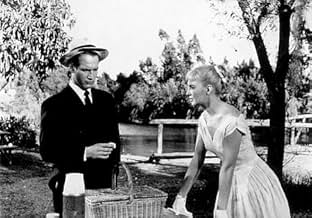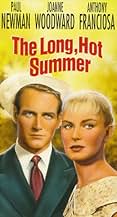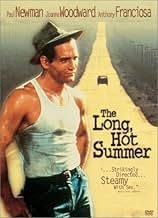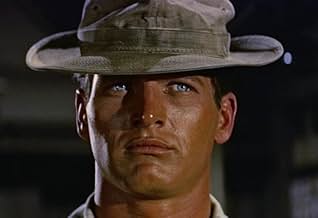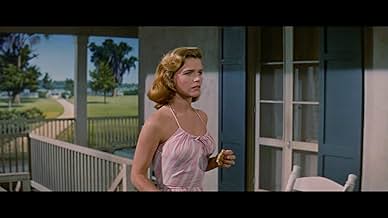Adicionar um enredo no seu idiomaAccused barn burner and conman Ben Quick arrives in a small Mississippi town and quickly ingratiates himself with its richest family, the Varners.Accused barn burner and conman Ben Quick arrives in a small Mississippi town and quickly ingratiates himself with its richest family, the Varners.Accused barn burner and conman Ben Quick arrives in a small Mississippi town and quickly ingratiates himself with its richest family, the Varners.
- Prêmios
- 2 vitórias e 4 indicações no total
- Lucius
- (as William Walker)
- Ambulance Driver
- (não creditado)
- Man at Auction
- (não creditado)
- Man at Auction
- (não creditado)
- Man at Auction
- (não creditado)
- Linus Olds
- (não creditado)
- Woman at Auction
- (não creditado)
- Direção
- Roteiristas
- Elenco e equipe completos
- Produção, bilheteria e muito mais no IMDbPro
Enredo
Você sabia?
- CuriosidadesDirector Martin Ritt was forever known after this movie as the man who tamed Orson Welles. During filming, Ritt drove Welles to a local swamp, kicked him out of the car and forced him to find his own way back.
- Erros de gravaçãoWhen Clara tells Ben off at the picnic, there is smoke wafting through the shot, apparently from cigarettes or cigars smoked by the director and/or crew.
- Citações
Clara: Mr. Quick, I am a human being. Do you know what that means? It means I set a price on myself: a high, high price. You may be surprised to know it, but I've got quite a lot to give. I've got things I've been saving up my whole life. Things like love and understanding and-and jokes and good times and good cooking. I'm prepared to be the Queen of Sheba for some lucky man, or at the very least the best wife that any man could hope for. Now, that's my human history and it's not going to be bought and sold and it's certainly not gonna be given away to any passin' stranger.
- ConexõesEdited into O Rei do Show (2017)
The Long, Hot Summer changes most of what happens in The Hamlet, but it still ends up feeling very Faulknerian (if a little Hollywoodized, especially around the ending). The Hamlet contains a cast of several dozen townfolk and the Snopes family, a Northern family of carpetbaggers who have their eyes set on the hamlet of Frenchman's Bend. The main character in the novel is Flem Snopes. His name is changed in the film to Ben Quick, who was himself one of the original townspeople in the novel (in fact, the Quick family, although they never play a major role in any novel or even short story, pops up constantly in Faulkner's mythology). Quick is played impeccably by Paul Newman. If Flem Snopes had remained as he was written by Faulkner, Paul Newman would have been way too handsome to play him. Instead, the screenwriters,Irving Ravetch and Harriet Frank Jr., have made him more likable without losing his complexities. They do it by making Ben Quick the little boy who runs away from his barn burning father ( from the short story, one of Faulkner's most anthologized, Barn Burning). That little boy disappears without a trace in Faulkner's writings. Flem Snopes, a teenager during Barn Burning, stays by his father's side afterwards.
Will Varner remains fairly intact in the film, the most enterprising of any person in the community. He may actually have a more complex character in the film than in the novel. The literary character is more or less an opponent who is forced to deal with Flem Snopes and his family. Here, Will Varner meets a man who reminds him too much of himself in Ben Quick. The filmic Varner has a rather selfish desire to have grandchildren before he dies, and he tries desperately to get his two children to reproduce for him. In the novel, Will Varner has 16 children. With Orson Welles, we should expect nothing more than the best, and we get another one of his masterful performances here. Will Varner is a lot like Hank Quinlan from Touch of Evil (which was released the same year), and the complexities that Welles communicates here are equal to his Charles Foster Kane or Harry Lime.
All the other characters are basically completely changed from the novel. Eula Varner is still a sexpot, but she is no longer Will Varner's youngest daughter, but his dauther-in-law (Flem Snopes originally married her). I don't remember Jody Varner too much from the novel, but I'm pretty sure the insecurities he feels towards Ben Quick were created by the screenwriters (Will Varner never got chummy with Flem Snopes in the novel, so there would be less of a reason for the hatred of Jody). I believe Clara Varner either didn't exist in the novel, or she was much less important. She certainly wasn't the school teacher, since he fell in love with Eula Varner at 13 and ultimately had to resign because of his lust, and then one of the Snopeses taught, I think I.O.
The part of this film that really gives it power is the amazing dialogue. I'm pretty sure that no direct dialogue, or at least very little, was taken from the novel. It was all created by Irving Ravetch and Harriet Frank Jr. It is absolutely poetic. I don't think that there is much dialogue in the novel. Faulkner rather likes to tell his stories silent for the most part. Also, if you are a Faulkner fan, or a fan of this novel in particular, keep your eyes open for echoes of other novels or of things that have dropped out here. There is the sewing machine salesman crack when Ben Quick is approaching Varner's mansion (a joke about the salesman Ratliffe, who provides a majority of The Hamlet's point of view), the hint at Absalom, Absalom! (when one of Varner's horses foals near the end), and the hint at A Light in August (the fire in the distance, the townspeople moving towards it). All in all, The Long, Hot Summer is a masterpiece. It is a beautiful, passionate, and intelligent film, and the best literary adaptation of which I am aware, or maybe only second to The Unbearable Lightness of Being.
- zetes
- 14 de abr. de 2001
- Link permanente
Principais escolhas
Detalhes
Bilheteria
- Orçamento
- US$ 1.500.000 (estimativa)
- Tempo de duração1 hora 55 minutos
- Cor
- Proporção
- 2.35 : 1
Contribua para esta página



